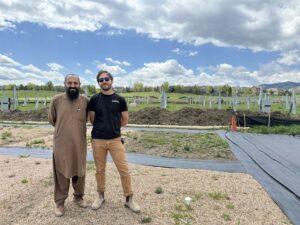On Thursday, May 15, the conservation committee visited Chatfield Farms for a behind-the-scenes tour of the horticulture research area. Our tour was conducted by Michael Guidi, Manager of Horticulture Research, who has a bachelor’s degree in plant biology form Ithaca College, and a master’s degree in Ecology from Colorado State University; and Dr. Syed Wali Jalalzai, Horticulture Assistant Researcher at DBG, Research Scholar, IIE, SRF Scholar, and MSU student exchange visitor, who has a PhD in soil science and agricultural chemistry from the University of Agricultural Sciences, GKVK, Bangalore, India, and was the Chancellor at Paktia University in Afghanistan prior to moving to Denver.
Dr. Jalalzai came to Denver Botanic Gardens as a result of work it pursued with scientists from three universities: Kabul, Paktia and Bamyan. These scientists have been working with the Afghan Fellowship Legacy Program Botanic Garden Network to establish botanic gardens in Afghanistan, and have been displaced from their university positions. Because of the challenging politics in Afghanistan, the Gardens applied to the Scholar Rescue Fund (SRF) to host a scientist from Afghanistan, and Dr. Jalalzai was assigned to Denver Botanic Gardens in February 2023.
In the spring of 2023, the Denver Botanic Garden horticulture research team implemented a large field experiment at Chatfield Farms to determine the most effective combinations of soil amendments and mulches to improve soil characteristics, reduce water loss, limit weed growth and promote healthy ornamental plant growth. To conduct the study, the team prepared over 16,000 square feet of land, removed existing vegetation, incorporated organic and inorganic amendments into the soil, and applied organic and inorganic mulches to the soil surface. The study includes only native and regionally adapted plants with low water requirements. The team has monitored plant growth, phenology (flowering of plants), and weed invasion, and sampled soils for physical and chemical analysis. Instruments were also installed in each plot to continuously measure the soil temperature and moisture content throughout the study.
The native and regionally adapted plants in the study general do not require high soil fertility or lots of organic matter. Instead, excellent drainage and open pore space are thought to be more important. Mulching and soil amendment practices have also been shown to significantly influence how water from precipitation and irrigation infiltrates the soil and how much of that water is lost through evaporation. One goal of the study is to compare how unique combinations of amendments and mulches differ in their ability to capture and retain water, promote plant growth, and reduce weed growth. Surprisingly, the early results show that inorganic soil amendments and inorganic mulch are creating the best outcomes. We plan to visit again in September 2024 to see the study plots in full bloom!
Michael Guidi has co-authored a book with Kevin Phillips Williams entitled, “Shrouded in Light: Naturalistic Planting Inspired by Wild Shrublands,” https://www.amazon.com/Shrouded-Light-Naturalistic-Planting-Shrublands/dp/1739903951, which was published on May 28, 2024.
Photo and article by Lynn D.

